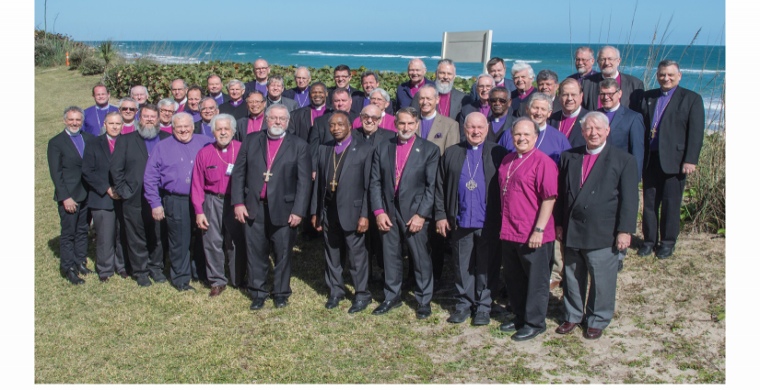ACNA Bishops Wrestle with Language over Homosexuality
By David W. Virtue, DD
www.virtueonline.org
January 21, 2021
Recognizing that there is deep confusion over the language of pansexuality currently raging in the Church of Jesus Christ, the ACNA College of Bishops have issued a pastoral statement on language to describe sexual identity.
We commend the usage of "Christians who experience same-sex attraction" as our preferred language to stifle confusion, they wrote in a pastoral statement.
"Our foundation is the Scriptural truth that God made us male and female in His image--a profound unity with distinction (Genesis 1:27). God established marriage between male and female to fill the earth through procreation (Genesis 1:28). Jesus and the Apostle Paul taught that marriage is the model of God's relation to humanity, the Church. It is a sacramental type of union by which humans work out their salvation with, and in, God's grace."
Acknowledging the universality of our sinful natures, the bishops said that they had heard from Christians who struggle with same-sex attraction within the Province in North America.
"We have heard some of you describe the experience of praying that these attractions would be lifted from you in one form or another, and yet you continue to live with this profound reality. We have heard some of you describe feeling as though you do not belong among progressive Christians who support same-sex marriage, but also feel alienated from your fellow orthodox Christians because of these attractions. We acknowledge that you have, on some occasions, felt ignored by fellow followers of Jesus to the point of feeling invisible. Many of you, in the midst of these heartbreaking experiences, are, together with all Christians, fighting the good fight to become more like Jesus. Please hear this: we love you, respect you, and pray that this statement will encourage you."
The bishops noted that research revealed an individual's attractions may move over time along a spectrum from same-sex attraction to other-sex attraction, or vice versa, in a minority of cases. "Therefore, a common cultural perception that some types of sexual attractions are always innate and permanent can, we believe, lead to unnecessary confusion and pain for some, especially children and teenagers."
The bishops recognized other matters of grave importance within the larger context of human sexuality such as gender dysphoria and bisexuality, but said these matters were beyond the scope of this statement.
"We cannot guarantee to Christians who are same-sex attracted, or to anyone, that their own desired future will occur if they follow Christ. We can promise that in Christ, there is a secured future of love, forgiveness, and power. And we must continue to teach all people that to follow and imitate Jesus is to live a life of full and glad surrender which daily requires us to take up our cross (Matthew 10:38)."
Jesus and Paul also extol, and themselves exemplify, the model of virginity for life and spirituality (2 Corinthians 11:1-2). They establish Christian celibacy as a normal, while less common, vocation of abstinent singleness for the sake of the kingdom (Matthew 19:1-12, 1 Corinthians 7:1-40).
The bishops noted three problems biblically and historically with using such designations as "gay Christian," and, for that matter, "same-sex attracted believer."
One, there is the confusion caused by lack of definition and common understanding of designations such as "gay Christian," and "same-sex attracted believer." The LGBT community does not distinguish living the lifestyle of a gay person from someone only having same-sex attraction. Certain Christian groups seem to be the only ones attempting to nuance gay behavior from same-sex attraction. The Christian community, however, is left without a commonly understood meaning. Confusion, misunderstanding, and misperception have resulted. This is the problem with using non-biblical and non-historical language in defining Christians and their groups.
Two, beyond the challenges of common understanding of the terms, in the Bible and in the history of Christianity, we do not find the people of God defining themselves or forming relationships and communities according to sexual desire and attractions. Instead, relationships and communities are defined in terms of commonly shared beliefs, prayer, commitments, and service.
Three, there is also the concern we have with adding more adjectives to describe different sorts of Christians. Weighing the biblical testimony, we certainly cannot in good conscience encourage more such modifiers without biblical or historical precedent. Designations such as "gay Christian," or "same-sex attracted Christian" are simply not what the spirit of the New Testament offers as a way of defining a Christian or his/her community. We are not ultimately "gay Christians" or "same-sex attracted Christians;" we are Christians. We are men and women whose lives are hidden in Christ (Colossians 3:3). Our journey of transformation is a pilgrimage in which we count all things rubbish for the surpassing worth of knowing Christ Jesus (Philippians 3:8). This is why the only name commended in Scripture to take over our identity is "Christ-in-one," (Christian).
We commend the usage of "Christians who experience same-sex attraction."
END














